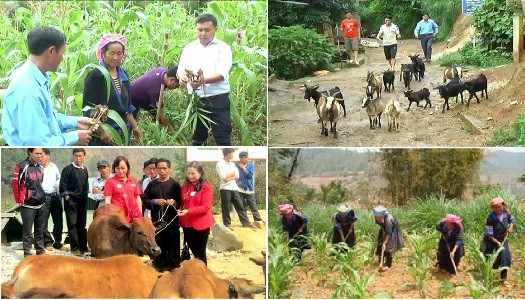(VOVWORLD) - Vietnam’s agricultural exports rank 15th in the world, but their competitiveness in the market is not yet significant. In recent years, Vietnam’s farm produce and vegetables have overcome severe barriers on quality standards to enter demanding markets like those of Europe or Japan.

Vietnam intends to increase export agricultural products in demanding markets (Photo: tapchitaichinh.vn)
|
Huy Long An is one of the first Vietnamese companies directly exporting agricultural products to Japan. Each year, it earns millions of USD from exporting bananas to Japan and the Republic of Korea, with last year’s revenue amounting to 3.3 million dollars.
To be able to export to demanding countries, Huy Long An has to grow 200 ha of banana pursuant to VietGap standard on cultivation and preservation, meet 200 criteria of Japanese businesses, and 170 criteria of the South Korean market in regard to land, water, fertilizer, pesticide, and daily cultivation practices.
It has also closely adhered to commitments with Japanese and South Korean businesses on food safety and hygiene. Thanks to its strong commitment, Huy Long An company has contracts to export bananas at twice the price of the local market. Receiving more orders, the company has cooperated with households in Trang Bom district, Dong Nai province, to grow 100-ha of bananas for export.
Director Vo Quan Huy said: “I invested in growing bananas with farmers. They have the necessary labor force. I have market experience and technical managers. We cannot let them use old customs of using chemicals. They have to follow new standards and be able to ensure the quality of their products. We have to keep our reputation for trust and quality in the interest of long-term cooperation.”
Most of Vietnam’s agricultural products are exported only in small and scattered volumes.
Experts say in order to increase exports to developed markets through official channels, Vietnamese products must meet international standards on quality and food safety and hygiene such as Hazard Analysis and Critical Control Point (HCAAP) and Global Good Agricultural Practices (Global GAP).
The Global GAP certificate is considered a good passport for Vietnamese products to enter distribution networks and retail chains in almost all developed markets.
Nguyen Hieu Huu in Tan Hiep commune, Binh Phuoc province, has a 5-ha farm of longan berries certified with Global GAP standards.
He said in order to again the certification, he invested 12,000 USD and spent a lot of time and effort on upgrading the farm and the warehouse facilities to store fertilizer and pesticide, together with the quarantine area, and quality control of water and land .
Huu suggests that farmers and cooperatives should cooperate with each other in applying Global GAP to save expenses:
“First we should apply Local GAP, seeing as how it is a transit step towards Global GAP. We should form cooperatives to share expenses in the interest of receiving large orders. I work on a small scale farm whose productivity can only fit 1 or 2 containers of longan berries. It will be more effective if we can meet bigger demand,” said Huu.
The Business Association of High-Quality Vietnamese Products (BSA) has worked with Global Gap organization to build Local GAP as an intermediary step for Vietnamese agricultural products to make their way into global markets